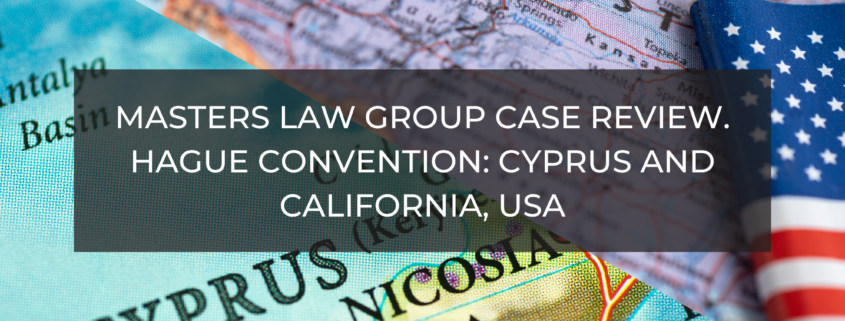MASTERS LAW GROUP CASE REVIEW: HAGUE CONVENTION ON CIVIL ASPECTS OF INTERNATIONAL CHILD ABDUCTION: Cyprus and California, USA
In one of our most recent Hague Convention cases, a child was wrongly removed from his residing home in Cyprus and taken to the United States. The attorneys at Masters Law Group succeeded in this landmark ruling in favor of our client.
The Hague Convention on the Civil Aspects of International Child Abduction is a crucial treaty that provides a legal framework for resolving cases of international child abduction. This convention aims to ensure the prompt return of children who have been wrongfully removed or retained from their country of habitual residence.
However, navigating these complex cases can be challenging, especially without the proper legal representation. At Masters Law Group, our team of Hague-experienced attorneys understands the intricacies of this International law treaty and can provide comprehensive support to families facing international child abduction matters.
In this recent case, the husband – represented by Masters Law Group – filed a petition for the return of his child who was taken from his residence in Cyprus to the United States by his wife – the mother of the child. The Hague Convention provides that a parent whose child has been wrongfully removed or retained in the United States may petition for the child’s return to his or her country of habitual residence.
CASE OVERVIEW
The ex-husband filed a petition for the return of his child, a 12 year-old who was visiting his mother in the state of California. This case arises under the International Child Abduction Remedies Act. 22 U.S.C. § 9001 et seq., which implements the Hague Convention on Civil Aspects of International Child Abduction. The Act entitles a person whose child has been wrongfully removed from his custody in another country and taken to the United States to petition in federal or state court for the return of the child.
In December 2022, the court held a five-day bench trial. The parties had stipulated that the 12-year old had been wrongfully retained under the convention. The trial focused on two affirmative defenses which were ‘grave risk’ and ‘mature child’ defenses.
CASE DETAILS
In this case, the child had lived most of his life in Cyprus. His father had full custody of him since his parents’ separation in 2014. Last summer of 2022, the minor came to the United States for a six-week visit with his mother in California. At the end of the visit, his father came to collect his son but was unsuccessful. The 12-year old has autism and had become determined not to return to Cyprus. Furthermore, his mother refused to turn him over when she was legally obliged to.
Nearly one week after the scheduled meet up went awry, the father filed a Hague Convention petition. The Court observed the 12-year old in chambers, where he answered questions from the Court and counsel for both sides without his parents present. The 12-year old was understandably subdued, but he was composed and calm through several hours of questions from strangers. That time observing the child, (after having had the benefit of testimony and reports from the experts) confirmed that he is on the Autism spectrum.
CASE RESULTS
Both the United States and Cyprus are signatories to the Hague Convention. It is implemented in the United States by the International Child Abduction Remedies Act. 22 U.S.C. §§ 9001 et seq. District courts have concurrent original jurisdiction over actions brought under ICARA. § 9003(a)–(b).
In adjudicating a petition under the Hague Convention, a court may only decide whether the child should be returned to their country of habitual residence. Both the treaty and the statute explicitly preclude courts from making a final custody determination.
The question at hand was where any further custody dispute over the child should play out, not whether living in one country or the other, or with one parent or the other, would be in his best interests.
Both parties agreed that Cyprus was his country of habitual residence at that time; and that the ex-husband was exercising his custody rights as entered by a Cypriot court. Dkt. No. 42.
The final part of the Convention’s grave-risk exception states that a Court may decline to return a child if it would place the child in an “intolerable situation.” Convention art. 13(b). Exactly what beyond physical or psychological harm would constitute an “intolerable situation” is unclear. It was concluded the child’s life in Cyprus with his father was not intolerable.
CONCLUSION
In summary, the court granted the petition and ordered the child to return to Cyprus in the custody of his father. In addition, the Court will not impose a longer stay without agreement from both sides. As the Court is ordering the return of a child pursuant to an action under 22 U.S.C. § 9003, it is required to order the respondent to pay necessary expenses incurred by the petitioner—including legal fees and transportation costs related to the return of the child—unless the respondent establishes that such order would be clearly inappropriate. § 9007(b)(3).
HAGUE CONVENTION – INTERNATIONAL CHILD ABDUCTION LAW WITH MASTERS LAW GROUP
Erin Masters and Anthony Joseph have extensive experience in cases involving international child custody disputes in both courts located in the State of Illinois and the United States federal court system.
Erin Masters and Anthony Joseph have extensive knowledge and experience with The Hague Convention on Civil Aspects of International Child Abduction (“The Hague Convention”) that was enacted into law through the International Child Abduction Remedies Act (“ICARA”) which provides that a parent whose child has been wrongfully removed from or retained in the United States may petition for the child’s return to his or her country of habitual residence.
SCHEDULE A CONSULTATION
If you are faced with instituting or defending child abduction proceedings under the Hague Convention on the Civil Aspects of International Child Abduction involving the United States, work with the experienced lawyers at Masters Law Group. Contact us here today to schedule a consultation.











